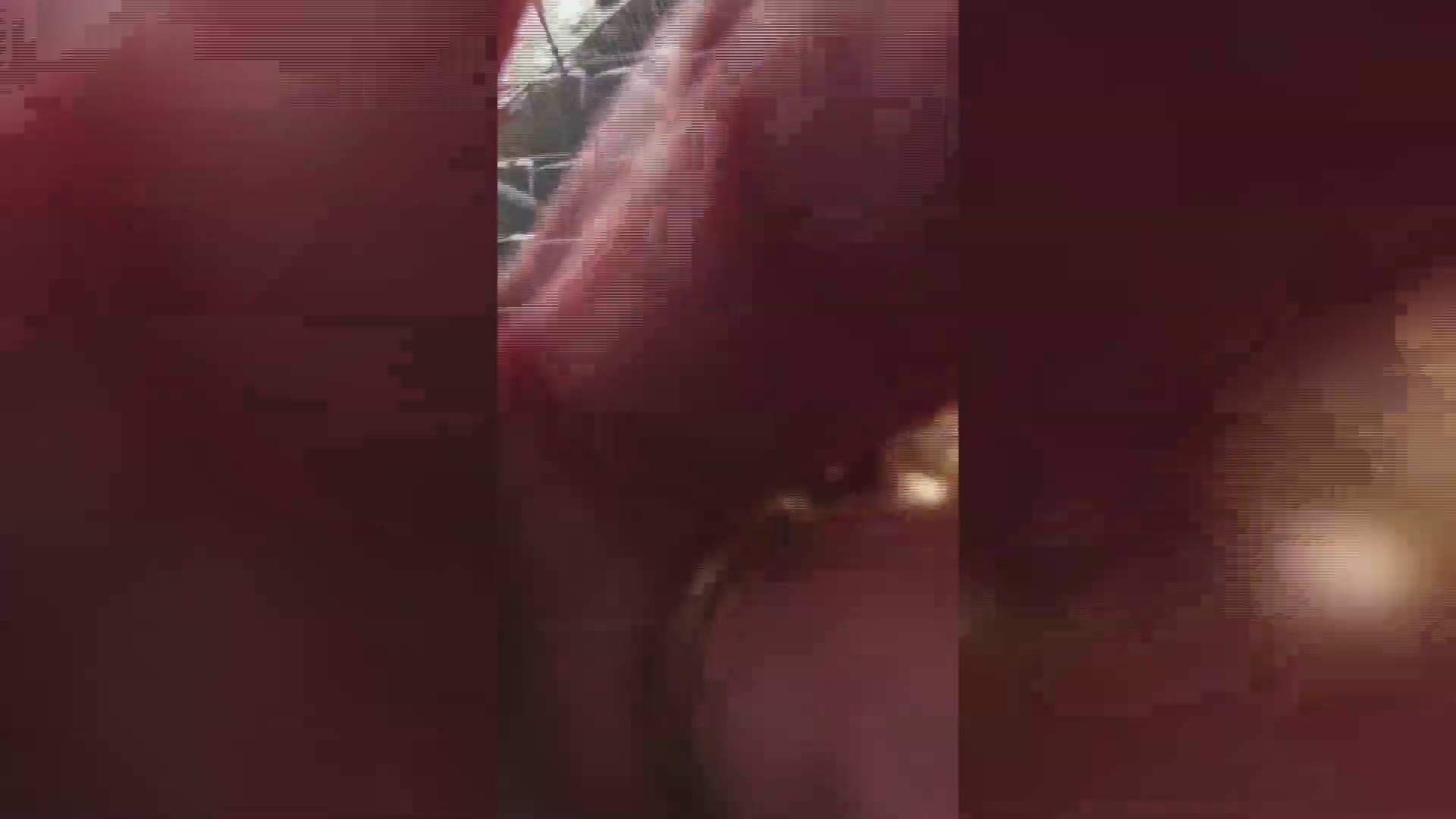DANDRIDGE, Tenn. — They see me long before I see them.
Winding up the gravel road to Wolf-PAWS Sanctuary in Dandridge, I feel several pairs of carnivorous eyes on me. Legend maintains - and one surprising iPhone video confirms - that a determined alpha female managed to jump the 8" fence last year. But there’s no cause for concern. That was just the one time.
I hear them though. Further back through lush evergreen, mournful howls leak through a slinky fog that situates comfortably into the hollers. Soon a lone wolf-dog emerges, magnificent and silhouetted against the shadows of her enclosure. I inch closer to the crisscross wires between us, trusting connections between man and nature that have somehow already been established.
Her 90-pound mate lunges out of my peripherals and onto the cage. Paws up, he’s as tall as me and I back up fast.
Of course, she was never really alone in there. These are pack animals after all.
“Dakota likes to challenge the human at the fence,” Jennifer Ackley, director and founder at Wolf-PAWS Positive Awareness Wolf-Dog Sanctuary, said. “If you flinch, game is on and he’s going to keep doing that. That’s just a game for him.”
All this – the early morning howl fests and dramatic near-escapes – adds up to daily life at Wolf-PAWS. It's a six-acre oasis that is home to eight of nature's most multifaceted creatures: wolf-dogs.
"Each one is an individual," Ackley said. "You can't say a wolf-dog is a breed of dog and you can't say they're wildlife."
So if the thing that jumped the fence at me looks so profoundly like a wolf but isn't wildlife, what on earth is he?
CONFLICTED BY NATURE
Wolf-dogs are a canine that has some dog genes and some wolf-genes. While a true 50-50 wolf-dog hybrid is rarely found anymore, even small percentages of wolf in a dog's blood turns them into a completely different animal.
"A lot of times there is a little conflict going on internally," Ackley said. "The dog in them wants to approach you. The wolf in them says: wait a minute there's a critical distance that I need to keep to feels safe."
Ackley has rescued all eight wolf-dogs at the sanctuary, some from the time they were puppies. Trust, when instinct so profoundly cautions avoidance, can be hard to come by.
"They're more like a fearful dog," Ackley said. "You don't want to look them right in the eye."
And yet, they're alluring in a way that causes people to fly into East Tennessee from as far as Czechoslovakia just for a chance to work with them.
"Their appearance is beautiful. Their soul is really beautiful," Ackley said. "When you look into their eyes...it's hard to describe. But they just have a mystique about them."
An undeniable mystique; and a specific set of skills that make it hard for them to be kept as pets. These animals are escape artists, quickly figuring out the dynamics of their enclosures even if they're heavily fortified.
Confined spaces are profoundly stressful for these animals.
"Even when you walk them through a gate they're looking up like, "What is this? Is this going to hurt me?" Ackley said. "So ours live outdoors 365 days a year."
The DNA differences that give way to an ethereal majesty you'd be hard-pressed to find at PetSmart tend to turn their lives tragic. Wolf-dogs aren't - aside from specific counties like Knox - illegal to own in Tennessee. But they're also overwhelming for the average person to take care of.
That means they are killed.
The National Wolf-Dog Alliance estimates that 65 percent of wolf-dogs are euthanized before they are three years old because once people eventually can't handle the demands of owning them, animal welfare organizations have their hands tied.
"I can understand why people want them as pets," Ackley said. "But once I learned how difficult they are to have as a pet and we started learning about how many are out there that needed a home, that's when we changed our tune form having them as a pet to forming a non-profit."
Still, people without resources continue to try their hand with them. Besotted with the idea of owning their own fabulous piece of nature and emboldened by shows like Game of Thrones which depict these animals as little more than hardcore pets, wolf-dogs are becoming more popular.
That's a problem because Ackley sees many backyard breeders or puppy mills leaning hard into an assumed wolfish identity for the animals they peddle. But an estimated three in four dogs who are marketed as wolf-dogs actually have no wolf-content.
This perpetuates the myth that these creatures can be kept indoors. In reality, the high demand they put on their owners means Wolf-PAWS rescues most of them from neglect or abuse cases.
"This is a much more natural environment for them, where they can really run at full speed they can hide out in the trees. They all just seem very happy here," Ackley said.
They do need humans to survive, though. Moonbeam, a low-content wolf-dog with striking blue eyes that belie her Husky heritage, was abandoned by her owner in 2019. Left on a 100-yard tie out, she escaped and spent months hunting for rabbits in the woods near Gatlinburg.
By the time Ackley got to her, she was emaciated and distrustful.
"It took me three months before she could trust me," Ackley said. "There are two animals that have been here for years and I still can't touch them."
With few true safe spaces available for these animals, that makes the job of connecting and providing for them that much more important.
"I'M NOT THEIR ALPHA."
Dakota and Leia, the high-content wolf-dogs who tricked me up at the gate, were the sanctuary's first bonded pair. It's their enclosure I step into first. Though Dakota challenged me at the gate, he lets bygones be bygones and allows me into his beautiful space.
"When we released the two of them in here it just gave me shivers because it was so beautiful," Ackley said. "It was so beautiful to see them run free for the first time in their lives."
As a rising sun illuminates the mist coming off the little pond inside their enclosure, I realize the connection these two animals have with each other couldn't be replicated by a human.
Indeed, Ackley confirms my suspicion that wolf-dogs need canine companionship to live a full life. Unlike humans, they intuitively understand what it takes to be a true alpha.
"They don't see humans as a pack member," Ackley said. "I'm not their alpha. I consider myself just part of the family."
As part of that family, she doesn't prescribe to the traditional notions of what it means to make partly wild animals respect you. Often, she says people try to alpha roll these animals to force them into submission. But Ackley, a certified dog trainer, implements rules of positivity and mutual respect to foster deeper connections with the wolf-dogs.
"If you show them love and respect, they'll love and respect you back," Ackley said. "[The relationship] is by no means permissive. A true alpha, like Leia, is calm but assertive. She'd never roll Dakota, he submits to her and that's why she's alpha."
Ackley said the most rewarding part of her job is the kisses that come from an animal who used to cower in fear of any human who came too close. The knowledge that she has made their lives better is profoundly rewarding.
Working in close proximity to these animals gives her an appreciation for them everyone else can't often see. Wolf-PAWS isn't open to the public, though they do offer private tours so people can get closer to these fantastic creatures. Those tours allow the public to see what a truly proper living space for these animals looks like. And education about them is more important than ever.
Wolf-PAWS is currently operating at full capacity and cannot rescue other animals.
As the sun finally rises fully over the treetops of Dakota and Leia's enclosure, I ask Ackley about that feeling of being watched, the sense that as soon as you get into the vicinity of these animals their eyes are on you. Am I erroneously projecting magical qualities onto animals who already suffer massively because of that association, or do these wolf-dogs really have some supernatural sense about them?
It's not just a feeling, Ackley says. In all the years she's looked after the wolf-dogs and Dakota especially, he's constantly scanning and always watching. He can't help it. It's in his nature.
"They just have this all-knowing sense. Like they know a lot more about the world than we do," Ackley said. "Or a lot more about nature anyway."
Want to get more involved with actually helping these animals? Wolf-PAWS accepts volunteers and donations on a rolling basis! You can fill out an application to volunteer right here.


